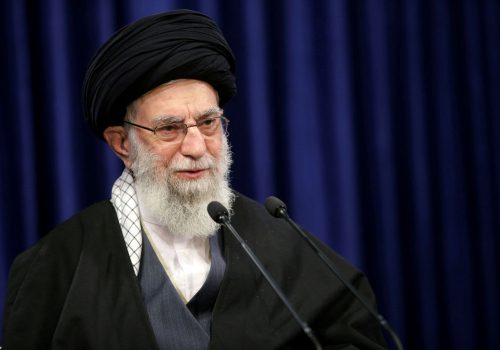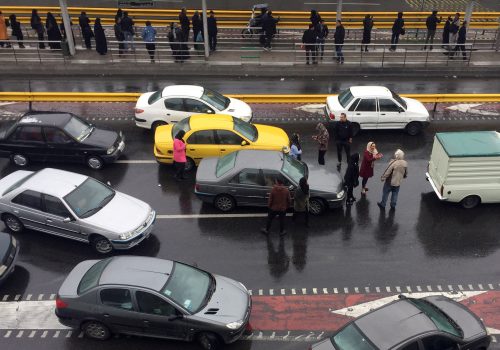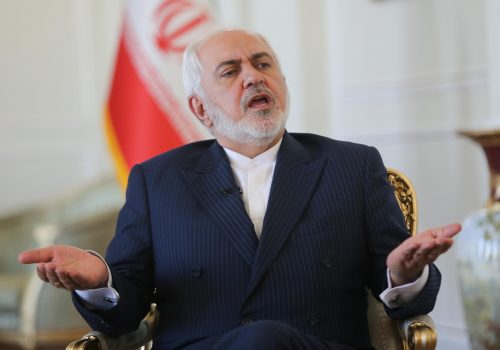Iran’s presidential elections don’t matter. Here’s why.
The Islamic Republic will hold its thirteenth presidential election on June 18. The Guardian Council, a twelve-member body comprised of six clerics and six attorneys, will announce the list of candidates allowed to run for president. While the final list of candidates will not be announced by the Guardian Council before May 26, it can be said with certainty that whoever emerges victorious will not have a material impact on Iran’s domestic or foreign policy.
Iran has had seven presidents. The first one, Abolhassan Bani-Sadr—who served a little over a year from 1980 until 1981—is in exile in France. The second one, Mohammad Ali Rajaei, was assassinated in a bombing in 1981. The third one, Ali Khamenei—who was president during 1981-1989—is the current Supreme Leader. The fourth, fifth, and sixth presidents have been sidelined after the end of their respective presidencies. Ali Akbar Hashemi Rafsanjani—who served from 1989 to 1997—was disqualified by the Guardian Council when he sought a third term in 2013. Mohammad Khatami, who was president from 1997 to 2005, has faced severe restrictions due to the 2009-2011 Green Movement; newspapers are barred from mentioning his name or printing his image until this day. His successor, Mahmoud Ahmadinejad—who was president during 2005-2013—has fared better, but he was also disqualified by the Guardian Council when he sought a third term in 2017.
What awaits current two-term President Hassan Rouhani after he leaves office is yet to be seen. The main point, however, is that even the Islamic Republic’s insiders are not necessarily tolerated. As such, the presidency of the Islamic Republic is not as important or politically relevant as foreign observers might believe it to be.
Taking a look at the Islamic Republic’s constitution shows why presidents, or elections in general for that matter, do not affect state policies. Article 4 of the constitution, for instance, states that all laws must conform with Islamic criteria. Six clerics on the twelve-member Guardian Council decide whether a law is consistent with Islam or not. The Supreme Leader appoints those six clerics. Therefore, even if a truly secular individual were to be elected president, he could not enact his agenda into law. This scenario is unlikely to unfold in the first place, because the Guardian Council decides who can run for president.
In 2017, the Interior Ministry reported that 1,636 persons had registered to run for president. Of those, the Guardian Council approved only six candidates. It should also be noted that according to Article 115 of the constitution, the president of the Islamic Republic must be a Shia, which excludes Iran’s religious minorities from running for office. The same article also mandates that the president must be a rajol-e siyasi, which is literally translated as “political man.” Some have argued that the term could encompass women as well. The Guardian Council has not issued an official interpretation of Article 115. Nevertheless, in practice, no woman has ever been approved by the Guardian Council to run for president.
As limited as the powers of the presidency are, the presidents of the Islamic Republic have been stymied even when trying to exercise their constitutional powers. For instance, while the president nominates the intelligence minister on paper, it is a well-known but unwritten rule that the Supreme Leader appoints that minister. In 2011, President Ahmadinejad defied Supreme Leader Khamenei by removing Heydar Moslehi, the Intelligence Minister. Khamenei rebuked Ahmadinejad publicly, issuing a letter to Moslehi and affirming his position as the Intelligence Minister. In 2017, President Rouhani stated that he “really wanted” to appoint three women to his cabinet, but expressed regret that “it didn’t happen,” suggesting that conservative elements or perhaps Khamenei himself blocked the nomination of women as ministers. Likewise, Rouhani did not appoint a single Sunni provincial governor. An interior ministry official was quoted as saying that the government was not permitted to appoint Sunni provincial governors.
Another clear example of the powerlessness of the presidency in the Islamic Republic is the ban on women’s entrance into soccer stadiums. There is no law banning women from entering a soccer stadium and the executive branch controls Iran’s sports arenas. Yet, women cannot watch a soccer match in person. Shahindokht Molaverdi, President Rouhani’s Vice President for Women and Family Affairs, tried to reverse the ban in 2015, but she relented, stating that the Rouhani administration was dropping the issue “out of respect” for senior clerics who opposed the move. In other words, the executive branch failed to achieve its stated goal on an issue on which it had full legal authority to act.
The upcoming June vote will be held in the context of the brutal crackdown on the November 2019 protests and the shootdown of Ukraine International Airlines Flight (PS752) by the Islamic Revolutionary Guard Corps. In its initial assessment of the November 2019 protests, Amnesty International stated that security forces had killed at least 304 people. Meanwhile, Reuters quoted three interior ministry officials as saying that the number of those killed stood at about 1,500. President Rouhani’s administration was involved in the crackdown, with the Interior Minister Abdolreza Rahmani Fazli admitting that security forces shot protesters both in the head and foot. Furthermore, the Rouhani administration shut down the internet for a week during the protests, enabling security forces to suppress the protests in a media blackout. The shootdown of PS752 on January 8, 2020, which killed 176 people on board, and the government’s attempt to cover up the shooting, are also on the minds of Iranians as the election approaches.
With both conservative and reformist camps implicated in the crackdown of November 2019 protests and the shootdown of PS752 and its cover-up, high turnout in the June 2021 election is very unlikely. Twenty-four years after the election of Khatami, who became president with the promise of reforming the Islamic Republic, all efforts at durable and systematic democratization of the Iranian government have failed. Frustrated by corruption, economic mismanagement, international isolation, and a lack of basic freedoms, it is difficult to imagine how the Iranian people could get excited about the June 18 presidential election.
Shahin Milani is the executive director of the Iran Human Rights Documentation Center (IHRDC). Follow him on Twitter: @shahinmilani81.
Image: Iranian President Rouhani on Military Influence April 28, 2021, Tehran, Iran: Iran s President HASSAN ROUHANI attending a cabinet meeting in the capital Tehran. Iran s foreign minister said he favors a smart adjustment between the military and diplomatic spheres, in his first public reaction to leaked audio of him bemoaning the military s influence. Mohammad Javad Zarif also said he regretted that the leak had triggered domestic infighting, amid a furious reaction from conservative figures and media outlets. Credit Image: Iranian Presidency/ZUMA Wire T


